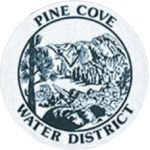The Idyllwild Water District’s Rules and Regulations Committee held a special meeting last week. Composed of directors John Cook, Warren Monroe, and General Manager Tom Lynch, the committee discussed possible changes to both Ordinance 62, which addresses establishing and implementing water emergencies within the district, and future resolutions about water shortages.
At the Wednesday session, Lynch focused on the definition of water emergencies and the criteria, which the board would use to establish future water emergencies and the different stages of emergencies.
The current water shortage emergency was established in November 2012. IWD elevated the emergency to a Stage 2 on Sept. 1, 2013. The criteria, which guided these decisions, were total local precipitation, the depth of Foster Lake, IWD’s surface reservoir and groundwater level for its well no. 10.
Lynch recommended using several wells close to Foster Lake. “I suggest we use the wells at the lake as the key recurring metric. They are the highest producers and impacted when Foster Lake drops,” he said. “Well depth is critical.”
A new possible criterion, which Lynch suggested, was the district’s current storage capacity.
“If we have trouble keeping tanks full, that’s an impact,” he told the committee. In response to a question from Cook about the ability of storage to supply water, Lynch said full capacity will supply about 75 days of water demand without any further refilling from the district’s water sources.
Another possible criterion, which Monroe suggested, is the percentage of total water production capacity IWD is using to supply water demand. “Based on the September report, we’re using 63 percent of capacity now. That’s getting dangerously close to capacity,” he noted.
Lynch also recommended that the committee re-examine the limitations imposed on customers during each of the emergency stages. During the current water emergency, customers have not expressed much concern during Stage 1, according to Lynch.
However, the ordinance limits new “will serve” letters to 10 during a Stage 1 period and Lynch said the definition of equivalent dwelling units, a measure of a structure’s water demand, should be changed to accommodate the requirements for fire sprinkler systems for new construction.
Another change the committee will consider is eliminating water-bill forgiveness during stages 2 or 3. Current IWD policy allows the board to forgive a portion of a water bill during unusual circumstances.
Customers are required to limit water use during Stage 2, Lynch said. “If a leak is forgiven, there is no punishment for this inordinate use and it’s more serious during a Stage 2 or 3.”
Lynch added that the IWD staff monitors customer usage, and large and unusual meters readings result in a call to the property owner, whether a local resident or non-local, alerting them to the change.
During the discussion of limited landscape watering during Stage 2, Cook recommended that Lynch modify the state recommendation to account for the time of day and temperatures at this elevation. For example, early evening watering in Idyllwild does not create the same water loss as at lower elevations where the temperatures remain much higher longer into the evening.
Another usage consideration will be banning car washing during a Stage 3. Kelly Clark, IWD’s office administrator, said, “The biggest [volume] of calls we get during a Stage 3 are about neighbors washing cars.”
While car washing is not prohibited, Clark asked the board whether the severity of a Stage 3 might warrant that change.
Future discussion may also address changes to the water rates as the district moves between the various emergency stages.










